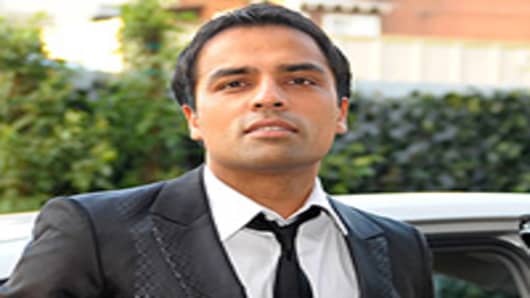At 16, Gurbaksh Chahal dropped out of high school to focus on his online advertising startup, ClickAgents. By 18, he had sold it for $40 million to ValueClick. He then founded another online advertising startup, BlueLithium, which Yahoo acquired for $300 million in 2007.
He has now launched another online advertising business in San Francisco, RadiumOne, which specializes in the social aspect of online advertising.
"There's an art to entrepreneurship," Chahal said. "You don't necessarily need an education for it. You just have to be able to learn and apply the creative juices that come to you."
The tech startup industry likes to see itself as a meritocracy, a place that rewards entrepreneurs with good ideas and the drive to seem them through — someone like Chahal, who didn't receive a formal college education, much less an Ivy League one, but who nevertheless founded two successful online advertising companies. (More: 11 Notable Entrepreneurs Teaching the Next Generation)
And with soaring tuition bills and students graduating with huge debts and no jobs, the value of higher education has been slammed in recent months. But while a college degree is by no means the only determining factor for a tech startup's success, it turns out that it does make a difference.
In a survey of technology entrepreneurs, the Kauffman Foundation found that graduates of Ivy League and top-tier universities were over-represented, with 8 percent from an Ivy League background and nearly 20 percent from a top 10 university such as UC Berkeley, Stanford and MIT. Overall, 92 percent had earned a college degree.
Tech founders with Ivy League degrees also tended to start companies that produced higher revenue and employed more workers than the average, the report added.
"Coming from an Ivy League school, you have a slight advantage," said Vivek Wadhwa, co-author of the report and a fellow at Stanford Law School. "But by no means does it give you a monopoly on being an entrepreneur."
The benefit of higher education isn't so much the classes that students take, but rather the network of people that surround them and the doors that are opened because of a college's reputation.
Entrepreneurs hailing from top-tier universities can easily tap a pool of similarly driven individuals to build their business. Particularly in the early days of a startup, the quality of the first few employees could make or break its future.
Take Mark Zuckerberg, for instance. He founded Facebook with his Harvard roommates. Yelp's Jeremy Stoppelman and Russel Simmons and YouTube's Chad Hurley and Steve Chen were among the entrepreneurs who came out of the University of Illinois at Urbana-Champaign and PayPal.
Google's Larry Page and Sergey Brin teamed up at Stanford, as did Yahoo's Jerry Yang and David Filo.
"Smart people recognize smart people," said Scott Sangster, an angel investor and CEO of Health in Reach, which helps schedule medical appointments. Startups "succeed on the strength of the team. What little advantage they have can make a difference in going out of business or becoming a multi-million dollar company." (More: An Apprenticeship to Rival Peter Thiel's?)
In the technology industry, connections matter. A college's alumni network can help startups as they seek funding from investors and guidance from mentors and advisers, as well as establish partnerships that could elevate the business.
Konstantin Guericke, one of the co-founders of LinkedIn, now offers coaching and mentoring to students and would-be entrepreneurs. But because he's deluged with requests, he tends to give preference to students from his alma mater, Stanford's engineering school.
"I don't feel a Stanford student is better than another one," he said. But "since there are so many, I use that as a filter."
Stanford has a unique advantage given its home at the heart of Silicon Valley. Top-tier universities such as Stanford also have established programs to help support and encourage entrepreneurship. Among other opportunities at Stanford is StartX, an incubator for student startups.
One of the StartX startups, MindSumo, aims to help businesses identify and hire promising college students. Businesses such as Microsoft and Facebook have used MindSumo to run online challenges, allowing students to compete and show that they have what it takes to solve real-world business problems.
While the 30 current participating universities include the expected well-known names, they also include several state schools. Co-founder and president Keaton Swett said it plans to add more colleges as demand increases.
"There's a huge wealth of untapped potential," said Swett. "If you're at a school that doesn't have name recognition, but your skills are equivalent (to students at a top-tier university), we want to give you a chance to compete for a job and get noticed and looked at by the top tech companies."
Landing such a job could make a difference for would-be entrepreneurs, as they pick up the skills and know-how and build the networks that allow them to take the leap into starting their own business. (More: Could the U.S. Run Out of Entrpreneurs?)
But ultimately, as a startup grows, the entrepreneur's educational background begins to matter less and other factors become more important, such as the ability to build strategic relationships or tap the talent of the company's employees.
Chahal said he had some advantages by not pursuing a traditional college education. He took risks that he may not have had he been caught up in data and theory from textbooks and lectures.
"I never understood what fear was, or what failure was," Chahal said about his early days as an entrepreneur. "When you apply so much logic and theory, fear and failure show up a lot more. You lose a little bit of creativity when you get lost in the numbers."
Still, when Chahal speaks today at colleges such as Columbia and UC Berkeley, he prefaces his talk with the advice, "Stay in school." He's the first to admit he took an unorthodox and sometimes difficult path to success.
"I got my MBA through experience," he said.



